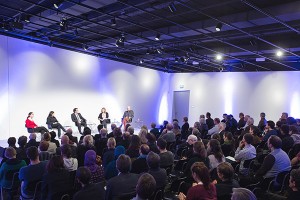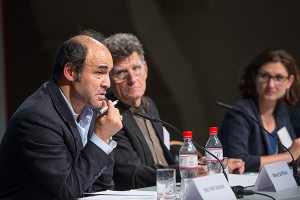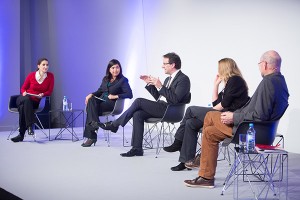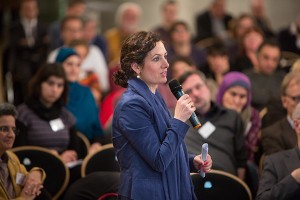Food for Thought from Our Recent Conference on “Migration and Integration Policy Today”
In the year 2000, the UN named 18 December International Migrants’ Day. Today, thirteen years later, Germany is well-established as a prime target country for migrants. Its population is plural, multi-religious, and multi-ethnic. Migration and integration therefore provide both politicians and academics considerable scope to tread new ground. But what state is migration and integration policy in today? And what role does academia play in shaping it? Which concepts have become obsolete, and which new perspectives are opening?

Panel discussion at the Academy of the Jewish Museum Berlin
© Jewish Museum Berlin, photo: Ernst Fesseler
On 22 November 2013, experts in migration research engaged in intensive and controversial debate of these questions at a conference jointly convened by the Jewish Museum Berlin, in the framework of its new “Migration and Diversity” program, and by the German “Rat für Migration,” a nationwide network of academics specialized in migration and integration issues. In the subsequent open forum with these invited guests, politics and science met head on: politicians and academics discussed, among others, migration policies proposed by Germany’s recently elected coalition government.
From “Social Integration” to the “Post-Migrant Society”?

Haci Halil Uslucan, Werner Schiffauer, and Ferda Ataman at the conference “Migration and Integration Policy Today”
© Jewish Museum Berlin, photo: Ernst Fesseler
There was consensus at the conference regarding problems inherent to the term “integration.” The popular, albeit simplistic interpretation is that integration is something only immigrants and their descendants need to pursue. While some wanted to replace “integration” with a new term, such as “inclusion,” others argued in favor of reclaiming the term “Integration,” but broadening its meaning—so as to establish integration as a task and a responsibility for all members of society.
The concept of the “post-migrant society” was also put up for debate. This term expresses the concern that people with a so-called “immigrant background”—many of whom who were born and raised in Germany, although their grandparents or great-grandparents were not—should no longer be regarded as “foreigners.” It advocates a paradigm shift by opening up new categories of diversity beyond ethnicity, culture, and religion. For far too long, researchers in this field have focused on minorities and have failed to ask whether (or not) the majority population is willing to integrate. Diversity today is a household term with positive connotations, yet public opinion remains largely blind to the fact that racism and discrimination are a part of everyday life in Germany. This is why, in the eyes of many researchers, social science has an important role to play: for it is a tool for critical reflection not only on politics and society but also on one’s own work and the nature of knowledge production.
Migration Policy in the Light of the Coalition Talks

Yasemin Shooman, Aygül Özkan, Miguel Vicente, Aleksandra Lewicki, and Dietrich Thränhardt
© Jewish Museum Berlin, photo: Ernst Fesseler
In the final panel discussion “Quo Vadis Migration Policy?,” Aygül Özkan, a member of the executive board of the CDU and formerly Minister of Social Affairs, Women, Family, Health, and Integration in Lower Saxony, and Miguel Vicente, State Commissioner for Migration and Integration in Rhineland-Palatinate and an SPD local counsellor, explained their positions on the conference themes; Aleksandra Lewicki, lecturer in political science at the University of Bristol, drew on her experience of British diversity policy to broaden the German viewpoint; and Dietrich Thränhardt, professor emeritus of political science at the University of Münster and with many years’ experience of migration research, took an historical look at the issue. He began by pointing out the long history of economically motivated migration. Moreover, he added, the current stigmatization of those “poverty-driven” Roma presumed likely to move to Germany reveals a dangerous disregard for history, more specifically for the extermination of Sinti and Roma under the National Socialist regime. Miguel Vicente drew attention to media misrepresentation: Young Spaniards, who also live in precarious conditions and put a strain on communities, are regarded more positively than Roma. Özkan emphasized that communities impacted by migration are overwhelmed and should be given support.

Naika Foroutan during the discussion with the audience
© Jewish Museum Berlin, photo: Ernst Fesseler
Against the backdrop of the Lampedusa disaster, asylum and refugee policies left their mark on the coalition treaty. And yet it was agreed that the measures adopted to integrate refugees into the labor market were insufficient. The primary focus of the open forum was to discuss what a reasonable anti-discrimination and gender equality policy might encompass. Lewicki noted that anti-discrimination work is more highly valued in the UK than in Germany: the size of their budget in comparison to that for Germany’s Anti-Discrimination Unit is telling.
In conclusion, Vicente appealed to academics to continue to advise politicians and to monitor their efforts, because they depend on such critical input.
New Impulses from the Academy of the Jewish Museum Berlin
The “Migration and Diversity” program expands the Jewish Museum Berlin’s scope of activity, both thematically and programmatically. This event series located at the interface of social science, politics, and public opinion has already given rise to poignant and stimulating exchanges. The questions raised regarding a paradigm shift in the field of migration and integration will be further debated and the insights gained deepened, among other occasions, at an international conference in November 2014 on the concept of the “post-migrant society.”
Betul Yilmaz and Rafiqa Younes, Academy Programs on Migration and Diversity
If you wish to learn more about future meetings, workshops, and events, please subscribe here to the newsletter of the Academy’s programs on migration and diversity.